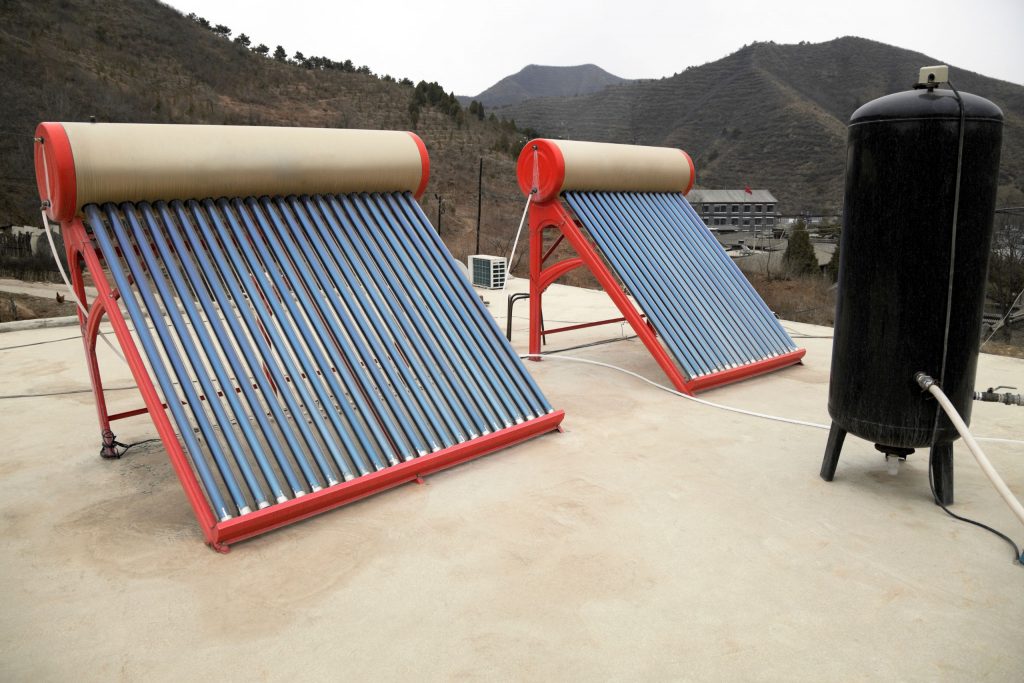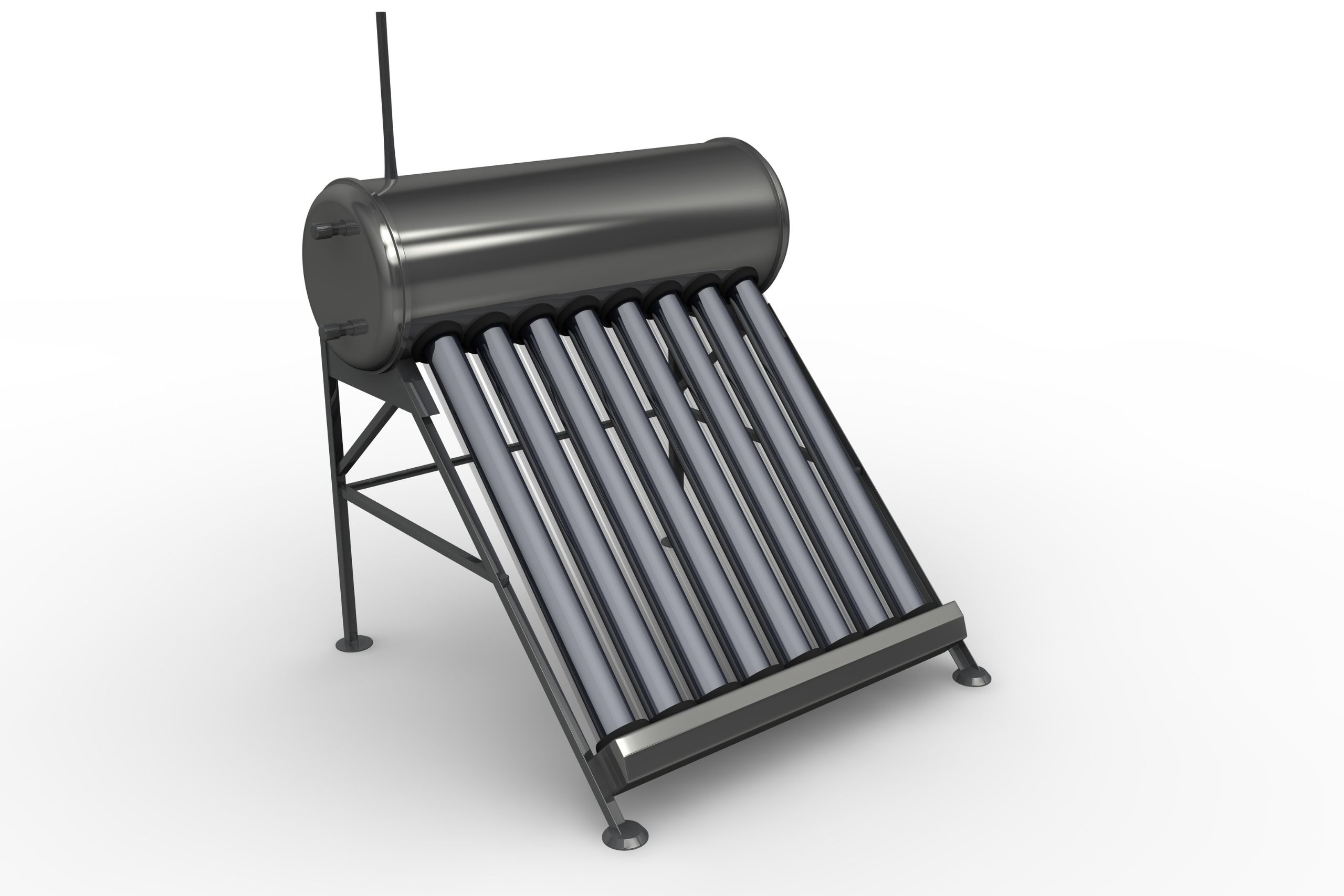A unique way to heat water with green energy is with a solar water heater. They use the sun’s energy to make a choice that is good for the earth and works well. Most of the time, these devices have holding tanks and solar sensors. If they have pumps and buttons, you can tell them apart from the quiet ones. The best places for active systems, which move a heat-transferring liquid or water through sun cells, are those that could freeze. As the cost of energy rises, solar water heaters become a smart choice because they use less dirty fuels, which is good for the earth. A solar water heater has many benefits, such as lowering carbon emissions, using less energy, and saving a lot of money on energy bills. The initial cost of solar water heaters is easier to handle with the help of tax credits and refunds from the government. Business and homes that care about the earth should choose them because of this.
How Solar Water Heaters Work
The sun’s heat is used by smart solar water heaters to warm water for use in the home. What these things are all about are solar panels, which are generally put on buildings. The sun’s light is turned into heat by these sensors. The heat is then transferred to a stream that moves through the device. Most of the time, this fluid is water or a mix of water and antifreeze. What’s hot is sent to a holding tank, where the water cools down and is saved for when someone wants a hot shower or to do the dishes.
For heating water with the sun, there are two main types: active and passive. Active systems are a bit more complicated. They use pumps and valves to move heat-transferring or water fluids around the system. They can be further broken down into straight circulation systems, which work best in places where it doesn’t get cold. On the other hand, passive systems don’t use pumps to move the hot water. Instead, they rely on natural circulation. Passive systems are easier to use and usually cost less, but active systems are better because they can better control the flow of heat. Because of this, active systems are often chosen in places where temperatures change often or where people need more hot water.

Types of Solar Water Heaters
It’s important to think about how well flat-plate collectors and evacuated tube collectors work in different areas when choosing between them for solar water heating. A common choice for home systems, flat-plate collectors are made up of a rectangular box with a clear lid and a dark absorber plate inside. Because they’re made to work well in warm, mild temperatures like Northern California, they’re long-lasting and affordable. On the other hand, vented tube collectors are designed to work well in colder places. The double-walled glass tubes and pressure in between them in these systems are great at keeping heat in, which makes them perfect for places with hard winters.
In addition to the type of collector, the circulation system is a crucial factor in selecting the best solar water heater. Direct circulation systems pump water directly through the collectors, which works well in climates that do not experience freezing temperatures. However, in colder areas, indirect circulation systems are more suitable. These systems use a heat-transfer fluid that circulates through the collectors and transfers heat to the water in a separate tank, preventing potential freezing issues.
Choosing the right type of solar water heater involves evaluating local climate conditions and specific household needs. For those living in sunny, mild regions, flat-plate collectors with direct circulation can be a practical and economical choice. In contrast, households in variable or colder climates may benefit more from evacuated tube collectors with indirect circulation systems, ensuring optimal efficiency and reliability throughout the year. Understanding these options will help homeowners make an informed decision that balances cost, performance, and longevity.
Key Benefits of Solar Water Heaters
Investing in solar water heaters offers homeowners substantial energy savings and a noticeable reduction in electricity bills over time. By tapping into the sun’s abundant energy, these systems provide a reliable and cost-effective way to meet a household’s hot water needs. They work seamlessly with backup systems to ensure efficiency, even when the sun isn’t shining as brightly. This adaptability not only helps in cutting down hefty energy expenses but also promotes a cleaner, more sustainable lifestyle.
Beyond the financial perks, solar water heaters bring significant environmental benefits. By reducing reliance on fossil fuels, they help lower the carbon footprint of a home, contributing to a greener and more eco-friendly planet. This shift towards renewable energy plays a crucial role in conserving natural resources, aligning with the goals of environmentally conscious individuals who aim to make a positive impact on the world. Plus, the long-term cost efficiency of these systems, coupled with potential increases in home value, makes them a smart investment for any homeowner looking toward a sustainable future.
Installation and Maintenance Tips
When it comes to getting the most out of a solar water heating system, location is key. Ideally, these systems should be installed on a roof with an unobstructed view of the sky, facing south to soak up as much sunlight as possible throughout the day. In regions with ample sunshine, like California, this setup can harness a significant amount of solar energy. Even areas with less sunshine can benefit from solar water heaters, especially if the collectors are positioned to maximize exposure during peak sunlight hours. Proper placement ensures the system operates efficiently, reducing reliance on backup systems and cutting down energy costs.
Regular maintenance is essential to keep solar water heaters running efficiently and to extend their lifespan. Cleaning the collectors periodically to remove dirt, leaves, or snow is important to maintain optimal energy absorption. It’s also a good idea to check for leaks or any wear and tear, particularly in the seals around the glass and pipes, as these could affect performance. With proper care, these systems can last for decades, offering an eco-friendly and cost-effective solution for hot water needs. Keeping up with maintenance not only ensures consistent performance but also maximizes the long-term savings and benefits of the system.
Choosing the Right Solar Water Heater for Your Home
When considering the switch to a solar water heater, several factors come into play to ensure it’s the right fit for your household. First, the size of the household is crucial, as larger families will naturally have greater hot water demands. It’s important to select a system that can accommodate the specific needs of the household size. The local climate is another key consideration, as solar water heaters are most efficient in sunny regions. However, even in areas with less sunshine, these systems can still provide substantial savings through backup heating options. Budget is also a significant factor, as the initial investment can be high. Fortunately, the long-term savings on energy bills and potential government incentives can help offset these costs.
Government incentives and rebates can make a significant difference in the affordability of installing a solar water heater. Many countries offer tax credits that cover a portion of the installation costs, encouraging more people to adopt solar technology. These incentives, combined with the potential for reducing hot water heating bills by 50-80%, make solar water heaters an attractive investment. It’s also vital to choose systems that come with trusted certifications, such as ENERGY STAR, to ensure high performance and durability. These certifications indicate that the systems meet stringent standards and can deliver consistent and reliable service, maximizing the benefits of harnessing solar energy.

Conclusion
Solar water heaters offer a range of benefits that make them an attractive option for homeowners looking to reduce energy costs and embrace renewable energy sources. By harnessing the power of the sun, these systems can significantly cut annual hot water costs, often by half, providing substantial savings and reducing dependence on fossil fuels. Additionally, government incentives, such as federal tax credits in the United States covering up to 30% of installation costs, make the transition more affordable. Solar water heaters not only enhance energy efficiency but also contribute to a cleaner environment by lowering carbon footprints. The long-term advantages of investing in solar water heating systems include sustainable energy use and financial savings, making them a wise choice for those committed to a more eco-friendly and economically prudent future.

